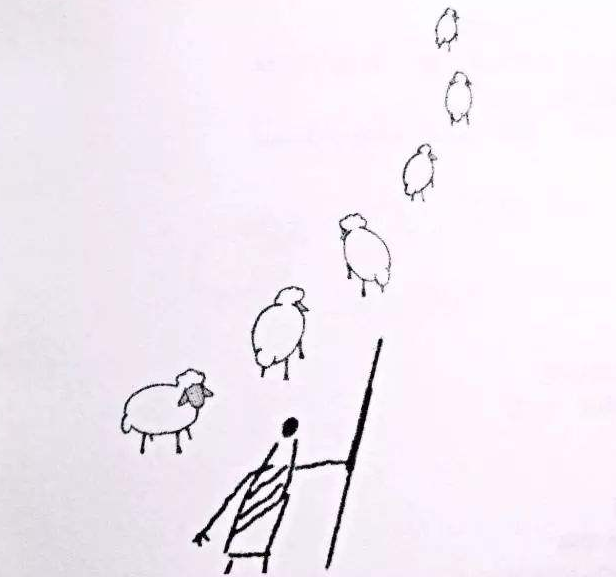Two more months passed, and the shelf brought many customers into the crystal shop.
又過(guò)去了兩個(gè)月,陳列架把許多顧客吸引到水晶店來(lái)。
The boy estimated that, if he worked for six more months, he could return to Spain and buy sixty sheep, and yet another sixty.
男孩估計(jì),再干上六個(gè)月,他就可以回西班牙并買(mǎi)上一百二十只羊。
In less than a year, he would have doubled his flock, and he would be able to do business with the Arabs, because he was now able to speak their strange language.
用不了一年,羊的數(shù)量就能翻上一番,而且還能跟阿拉伯人做生意,因?yàn)樗呀?jīng)會(huì)講那種奇怪的語(yǔ)言了。
Since that morning in the marketplace, he had never again made use of Urim and Thummim, because Egypt was now just as distant a dream for him as was Mecca for the merchant.
這段時(shí)間,他一直沒(méi)動(dòng)過(guò)烏凌和圖明。因?yàn)榘<皩?duì)于他來(lái)說(shuō),就像圣城麥加對(duì)于水晶商人一樣,早已變成了一個(gè)遙遠(yuǎn)的夢(mèng)想。
Anyway, the boy had become happy in his work, and thought all the time about the day when he would disembark at Tarifa as a winner.
男孩現(xiàn)在很滿(mǎn)意自己的工作,并且無(wú)時(shí)無(wú)刻不在憧憬著凱旋塔里法的那一天。
"You must always know what it is that you want," the old king had said.
“切記,你永遠(yuǎn)都要清楚你想要什么。”撒冷王對(duì)他說(shuō)過(guò)。
The boy knew, and was now working toward it.
男孩很清楚自己想要什么,并且正在為此而工作。
Maybe it was his treasure to have wound up in that strange land, met up with a thief, and doubled the size of his flock without spending a cent.
也許他的財(cái)寶就在這塊陌生的土地上,他遇到過(guò)一個(gè)騙子,但之后一分錢(qián)沒(méi)花就使他的羊群翻了一番。
He was proud of himself.
男孩感到非常自豪。
He had learned some important things, like how to deal in crystal, and about the language without words ... and about omens.
他學(xué)到了一些很重要的東西,比如做水晶生意,不用語(yǔ)言的表達(dá)方式,以及發(fā)現(xiàn)預(yù)兆。
One afternoon he had seen a man at the top of the hill, complaining that it was impossible to find a decent place to get something to drink after such a climb.
一天下午,他在山丘頂上見(jiàn)到一個(gè)人發(fā)牢騷,說(shuō)爬上坡頂竟找不到一個(gè)像樣的地方喝飲料。
The boy, accustomed to recognizing omens, spoke to the merchant.
男孩早已熟悉了預(yù)兆,便找到店主談話(huà)。

"Let's sell tea to the people who climb the hill."
“咱們賣(mài)茶給那些爬到山坡上來(lái)的人喝吧。”
"Lots of places sell tea around here," the merchant said.
“這里有很多人賣(mài)茶。”老板回答說(shuō)。
"But we could sell tea in crystal glasses. The people will enjoy the tea and want to buy the glasses.
“我們可以把茶水盛在水晶杯里來(lái)賣(mài)。這樣一來(lái),人們不但會(huì)喜歡茶水,還愿意購(gòu)買(mǎi)水晶杯。
I have been told that beauty is the great seducer of men."
因?yàn)槊利愖钜琢钊苏鄯!?/div>
The merchant didn't respond, but that afternoon, after saying his prayers and closing the shop, he invited the boy to sit with him and share his hookah, that strange pipe used by the Arabs.
水晶店老板盯著男孩看了一會(huì)兒,什么話(huà)也沒(méi)說(shuō)。但是,那天下午做完祈禱,關(guān)上店門(mén)之后,他和男孩在路邊坐下來(lái),并邀請(qǐng)男孩吸水煙,就是阿拉伯人使用的那種奇怪的煙斗。
"What is it you're looking for?" asked the old merchant.
“你現(xiàn)在想得到什么?”水晶店老板問(wèn)。
"I've already told you. I need to buy my sheep back, so I have to earn the money to do so."
“我已經(jīng)對(duì)您說(shuō)過(guò)了。我要把我的羊群買(mǎi)回來(lái)。辦這件事需要錢(qián)。”
The merchant put some new coals in the hookah, and inhaled deeply.
店主往煙袋里加了些炭火,然后深深地吸了一口。
"I've had this shop for thirty years. I know good crystal from bad, and everything else there is to know about crystal.
“這個(gè)店鋪我已經(jīng)開(kāi)了三十年,我會(huì)識(shí)別水晶的好壞,了解水晶的所有特性。
I know its dimensions and how it behaves.
我熟悉每塊水晶的大小和折光度。
If we serve tea in crystal, the shop is going to expand. And then I'll have to change my way of life."
如果你用水晶杯盛茶水賣(mài),商店必然會(huì)擴(kuò)大,這樣一來(lái),我就必須改變我的生活方式。”



